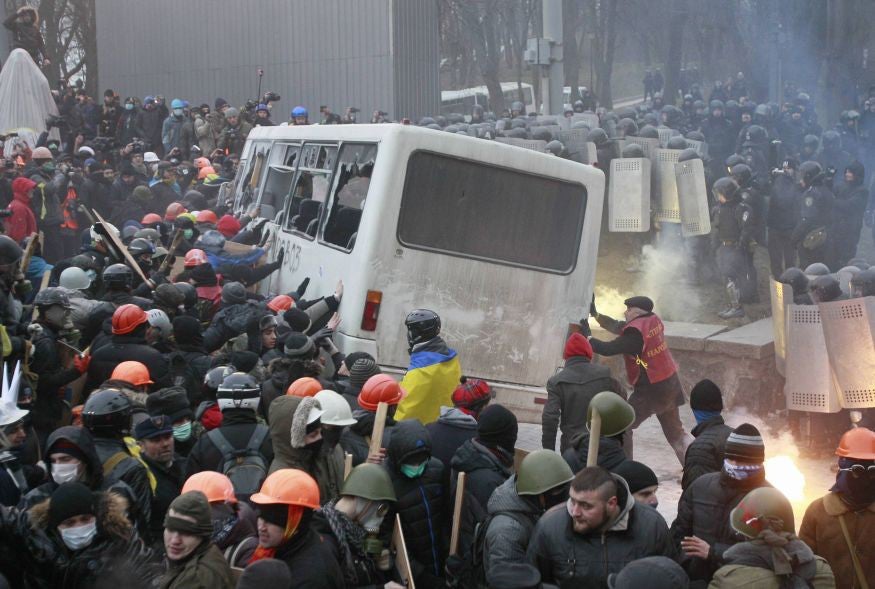Vitali Klitschko caught up in clashes as tens of thousands defy Ukraine protest ban
Heavyweight boxing champion and opposition leader Vitali Klitschko caught up in demonstrations in capital Kiev

Your support helps us to tell the story
From reproductive rights to climate change to Big Tech, The Independent is on the ground when the story is developing. Whether it's investigating the financials of Elon Musk's pro-Trump PAC or producing our latest documentary, 'The A Word', which shines a light on the American women fighting for reproductive rights, we know how important it is to parse out the facts from the messaging.
At such a critical moment in US history, we need reporters on the ground. Your donation allows us to keep sending journalists to speak to both sides of the story.
The Independent is trusted by Americans across the entire political spectrum. And unlike many other quality news outlets, we choose not to lock Americans out of our reporting and analysis with paywalls. We believe quality journalism should be available to everyone, paid for by those who can afford it.
Your support makes all the difference.Demonstrators armed with flares and fire extinguishers battled with riot police on the streets of Kiev on Sunday night as anger mounted among the tens of thousands of Ukrainians rallying against their government in defiance of new anti-protest laws.
Vitali Klitschko, the boxer-turned-opposition leader, had urged supporters in Independence Square to remain calm and refrain from provoking the police. But after a largely peaceful day of speeches and chanting in the bitter January cold, a small group of protesters attacked police with flares, fireworks, sticks and fire extinguishes as they tried to breach the parliament building.
Protesters rammed and smashed the windows on buses forming a barrier to the parliament, while police protected themselves with their shields as plumes of smoke and fireworks shot into the air. As night fell the splinter group appeared to be pulling back and rejoining some of the estimated 100,000 people who had packed into central Kiev.
A legal push by President Viktor Yanukovych to cripple the protest movement brought many people back out on the streets after a Christmas and New Year lull, and spurred some of the most violent scenes seen so far in the two months of rallies against the government.
“Yanukovich and his henchmen want to steal our country,” Mr Klitschko, who is expected to challenge the incumbent in Presidential elections next year, told the crowds before the outbreak of violence. “Ukraine is united as never before in its struggle against those in power today, in its determination not to allow a dictatorship.”
Many of the protesters were wearing pots and pans or construction helmets on their heads, a symbol of defiance against the new anti-protest laws, which were rushed through parliament on Thursday. They include a ban on wearing hard hats or masks at rallies, fines and prison sentences for setting up unauthorised tents or stages, and curbs on the dissemination of “extremist information” about the nation’s leaders.
The new laws are aimed at extinguishing a protest movement which began on 21 November after President Yanukovych abruptly backed out of signing an agreement promising closer trade and political ties with the European Union. His decision to instead turn to Russia for financial assistance outraged many people who had pinned their hopes for a more prosperous future on closer ties with the EU, rather than with their former Soviet rulers.
The battle for Ukraine’s soul has also soured relations between the EU and Russia, with European politicians accusing Moscow of using blackmail and bribery to keep Kiev within their sphere of influence. This week the EU announced that they were cancelling a dinner with Russia’s President Vladimir Putin during EU-Russia summit on 28 January to show it was not “business as usual”.
Current events in Ukraine are expected to be discussed on Monday at a meeting of foreign ministers in Brussels. The EU and US have already expressed concern about the new laws. The US State Department issued a communiqué calling them “undemocratic”.
The EU envoy to Ukraine, Jan Tombinsky, said the way the law was rushed through parliament with MPs voting with a show of hands rather the usual electronic voting system, which allows the opposition to block legislation, suggested that the “credibility of democratic institutions and of the legal system is at stake”.
While Sunday represented the largest numbers on the streets so far this year, Mr Yanukovych does have the backing of many Ukrainians, particularly in the East of the country. It is unclear if the protesters will be able to bring about any significant changes before the February 2015 elections.
Opposition leaders have announced a plan to start a petition and collect signatures expressing a lack of confidence in the government, and want to set up a people’s assembly with a new constitution. Mr Yanukovych does however retain a majority in parliament and last month survived a vote of no confidence tabled by the opposition.
Join our commenting forum
Join thought-provoking conversations, follow other Independent readers and see their replies
Comments